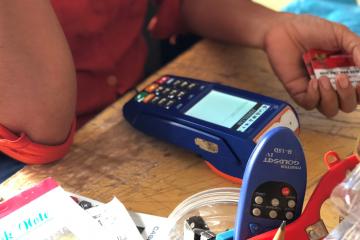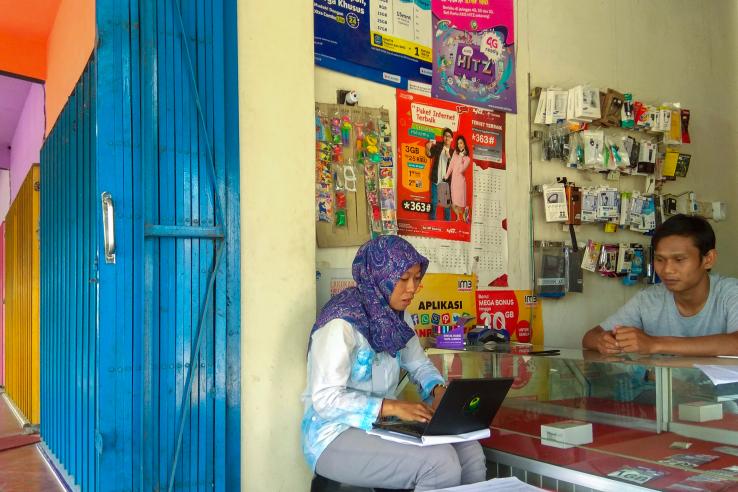
How digital financial services and e-commerce can help curb the impact of COVID-19 on people's livelihoods

Read this post in Bahasa Indonesian.
Countries across the world have imposed unprecedented restrictions on mobility and social interaction to combat the spread of COVID-19. Indonesia is no exception.
In April, the government of Indonesia announced the enactment of large-scale social distancing regulations (Pembatasan Sosial Berskala Besar, PSBB) and banned travel for the upcoming Eid holiday, when tens of millions of Indonesians typically return to their home villages to celebrate with family.
Other restrictions include instruction to work from home, closures of public spaces and transport, and even travel bans to and from specific locations. These measures have profoundly impacted many aspects of people’s lives—from the way people communicate, work, obtain goods, and transact.
In the midst of this, there is a growing push to accelerate e-commerce and adoption of digital financial services (DFS). Anecdotal data from J-PAL Southeast Asia’s Inclusive Financial Innovation team’s conversations with e-commerce platforms in Indonesia suggests an increase in both the number of transactions and the number of new users. Specifically, there has been an increase in demand for purchases such as staple foods, health products, and school supplies.
Instructions to practice social distancing and to avoid public places have encouraged individuals to shift from procuring daily necessities offline to using online sources. In addition, digital payment may play an increasingly important role as it facilitates e-commerce transactions and remittances to far-away family members.
How can DFS and e-commerce help curb the impact of Covid-19?
For those with access to mobile phones and digital literacy, e-commerce and DFS may help people to maintain their livelihoods. Not only does DFS offer a fast and contactless means of payment and transfer, but evidence from around the world has found other benefits.
For example, there is strong evidence that mobile savings and remittances can be used to improve risk-sharing between individual's social networks and smooth consumption. In Rwanda, during a time of crisis, remittances through mobile airtime accounts were used by less impacted individuals to help relieve the pressure of income loss for people who were affected the most.
E-commerce can be a valuable way for people to locate and purchase scarce resources, especially in remote areas or localities experiencing shortages. However, an important concern during the COVID-19 crisis is price gouging, or exorbitant price increases for items in high demand. Currently major Indonesian e-commerce firms are launching initiatives to limit this practice.
But who will enjoy these benefits? Despite its promises, DFS and e-commerce are still inaccessible to most people. To shed light on Indonesians’ access to DFS, we turned to the latest round of the Financial Inclusion Insights Survey, conducted by SNKI (Sekretariat Nasional Keuangan Inklusif, or National Council for Financial Inclusion) and Kantar. These data were collected between March and May of 2019 and are nationally representative: thus, they give us a relatively up to date picture of digital inclusion across the country.
The first thing to note is that the vast majority of Indonesians have no experience with e-money.
Overall, just 6.8 percent of people reported having ever used e-money in 2019.
Use is strongly correlated with education: while just 5.2 percent of people with junior high school education use e-money, 27.3 percent of university graduates use the service. Still, the vast majority of even the most educated individuals lack exposure.

There is a bright spot, however: the survey suggests many more Indonesians are capable of adopting DFS.
Smartphone ownership is an especially important proxy to measure potential access to e-money and e-commerce. While smartphone ownership is also strongly correlated with education, the graph makes it clear that many non-users of e-money have the tools to adopt. Other analysis from SNKI’s report on the survey shows that smartphone skill levels are also high. Thus, there is an opportunity to onboard a sizable amount of the smartphone owners to DFS and e-commerce in the near term.
Potential for greater DFS and e-commerce adoption
There are at least two major opportunities that providers can leverage to boost digital financial inclusion.
First, the government has started to expand the channels of some of its government-to-people transfer programs to include e-money platforms, which may activate inactive e-money users or create new ones.
Second, the demand for digital remittances may continue to rise especially as the religious festival, Eid, is approaching. It is central to the Eid tradition that people across socioeconomic groups give out allowance money to family members. With the travel restriction in place, a digital alternative to remitting funds will be in demand.
However, onboarding a broader segment of people into the DFS and e-commerce ecosystem will rely on providers’ ability to appeal to them.
A big part of this effort may include easing the onboarding process and making these services more accessible. For example, DFS platforms could make the registration and verification (“Know Your Customer”) process less complicated or prepare easy-to-understand introductory materials for new e-money users.
To improve accessibility, existing e-commerce or DFS agents can be leveraged to disseminate introductory messages and information campaigns more broadly, in addition to helping more people access DFS and e-commerce products or services. Of course, ensuring that this approach also supports good social distancing practices is important.
J-PAL Southeast Asia’s Inclusive Financial Innovation Initiative (IFII) is working alongside governments, private sector firms, and nonprofits to explore how DFS and e-commerce can further support people’s livelihoods during this COVID-19 crisis.
This blog post draws on background research conducted as part of these effort funded by the Bill & Melinda Gates Foundation. The findings and conclusions contained within are those of the authors and do not necessarily reflect positions or policies of the Bill & Melinda Gates Foundation. The mission of IFII is to ensure that digital financial services can drive economic development while lifting up women, low-income groups, and marginalized communities.
For more information about IFII, contact Aliyyah Rusdinar.
